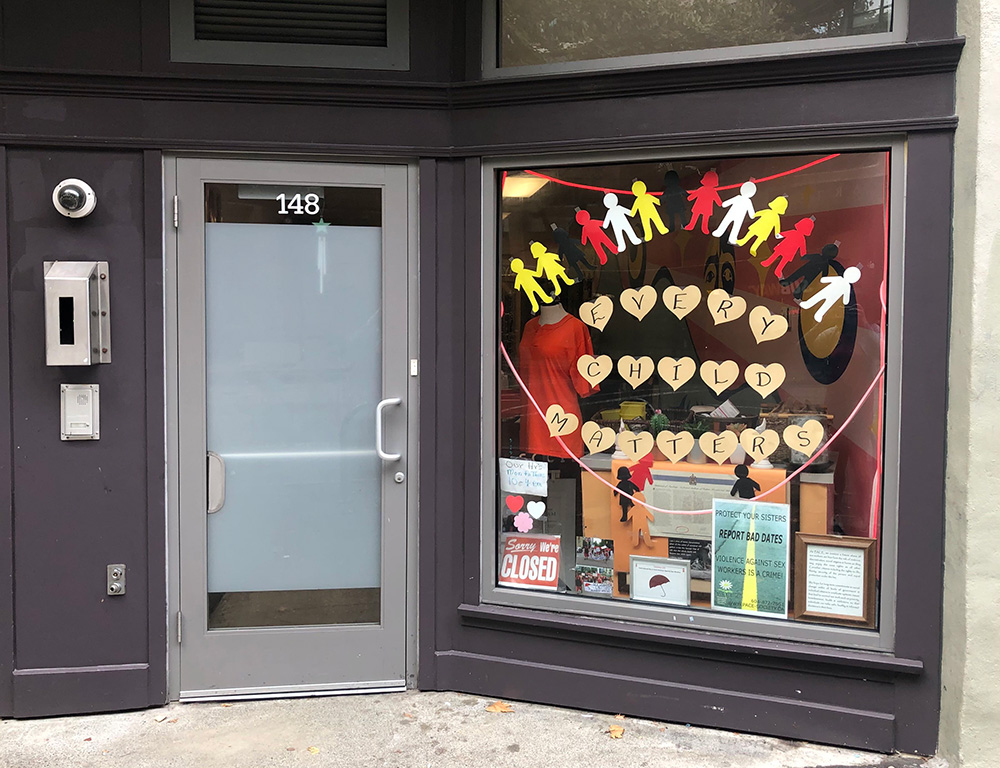“I honestly never expected it to actually happen,” Taylor Quinn says.
But it did. After over a year of rumours and false alarms, OnlyFans, the website that Quinn and thousands of sex workers depended on for their livelihoods, announced in August it would ban adult content.
Following a swift backlash, the company reversed the decision.
But for workers like Quinn, who posted adult-oriented video and photo content to OnlyFans, the damage had already been done.
“All of us are trying to figure out: where do we go?” she said. “What platform do we go to? How do we make sure that our fans move? How do we make sure that they’re confident in moving? It’s confusing, frustrating and just blood boiling.”
OnlyFans was started in 2016 as a platform for performers of any kind to post videos or photos that would be available to paid subscribers. It became widely known as a platform for sex workers following a majority acquisition in 2018 by pornographer and businessman Leonid Radvinsky.
But COVID-19 created a new market. With women bearing the worst of the pandemic’s economic impact, and other forms of sex work such as strip clubs, escort services and brothels forced to temporarily shut down, many took to the internet to make ends meet — some for the first time.
After weathering COVID — and in an already precarious industry that is constantly assailed by political, religious and business interests — Quinn and other OnlyFans users feel they have yet again been targeted.
After initially becoming interested in nude modelling through Suicide Girls, Quinn joined OnlyFans in 2019.
“I was on Tumblr, and I was following some of the models and I was really taken aback by their confidence and owning their bodies,” she says.
Quinn is now a part-time sex worker — a term that covers a wide range of activities from nude modelling to escorting to exotic dancing and more. (Pace Society, a Vancouver-based organization that provides education, support and advocacy for sex workers, defines sex work as “the exchange of intimacy, affection, emotional or physical labour, fetishistic or sexual acts for material goods.”)
The initial emails OnlyFans sent to creators about their pivot away from adult content were confusing, indicative of the vague criteria surrounding just where the lines are drawn around sex work.
A copy of the email Quinn provided to The Tyee stated that OnlyFans would “prohibit the posting of any new content containing sexually explicit conduct. Content containing nudity will continue to be allowed as long as it is consistent with the policy.”
Quinn went through the policy carefully, trying to understand what it meant when it tried to draw a line between sexually explicit conduct and nudity.
“When and where you draw the line of when nudity is art versus not art anymore, is just ridiculous to me,” she says.
Ultimately, the rules were so confusing, and the company’s actions were seen as so poor, that a large number of creators simply opted to leave.
Many of these creators responded to a tweet from OnlyFans on their policy reversal, stating that they had already found new places to continue working.
Quinn was one of them. As a content creator making roughly 75 to 80 per cent of her income from sex work, 65 per cent of which came from OnlyFans, her move to a new platform, Fansly, was one of financial necessity.
Beyond the monetary strain, there was a mental strain as well: a terrible feeling that was all-too-familiar for those in the industry.
“It’s always going to be that a platform will be small or medium, and sex workers will find a place in that platform, and they will build it up,” says Quinn.
“And once they have enough of those particular pieces that sex work has brought to them, they go, ‘well, now’s the time we drop the sex work.’ And it happens every time.”
There are multiple instances of online platforms banning adult content, often at the expense of sex workers. Tumblr’s 2018 ban on adult content. Craiglist’s removal of its “Adult Services” section in 2010, followed by its removal of Personals in 2018, bowing to pressure from U.S. state attorneys. Backpage, an advertising site for sex workers, was shut down in 2017 after U.S. officials laid criminal charges. The judge declared a mistrial last month.
Ray Harridan, a full-time sex worker who has been involved in the industry since 2017, echoes Quinn’s feelings on OnlyFans: it’s an unfortunately familiar type of situation.
The Vancouver-based escort says she relied on OnlyFans to supplement her income during the pandemic, and although she wasn’t as adversely affected by the policy changes as others, she was reminded of how her profession is persecuted online and offline.
“There’s a broader process of targeting sex workers, both on the internet and off the internet, and that’s driven by criminalization, and we know that this is also driven by Christian groups and right-wing groups.”
The anxiety of being under attack from those groups is real and lasting, Harridan says. She believes it is especially harmful to people of colour, non-binary and trans individuals, and for those who do not conform to traditional ideal body types.
In particular, the loss of online markets risks the safety of these vulnerable workers.
“I have the ability to work with a lot of safety,” Harridan says. “But the more expensive and the less accessible it is in order to advertise and find clients, and for clients to find us, means that we are less able to do screening, to have choice, to keep each other safe.”
She says that a shrinking number of safe spaces for sex work also encourages exploitation in the remaining areas. In her own business, Harridan says she is feeling the pinch as platforms cash in on vulnerable workers with limited options.
“The loss of advertising spaces has impacted me financially,” Harridan says. “Because I don’t have options in where I advertise, I only have one site to go to, and that site knows, and takes advantage of the fact that we have no labour rights as sex workers.”

Pace Society offers services aimed at helping sex workers access those rights. Unfortunately, the COVID-19 pandemic has made it challenging for the non-profit society to stay in touch with some of their members, as they have temporarily closed their drop-in for the interests of safety.
“I know a lot of sex workers have shifted to online work because of the pandemic,” says Lyra McKee, co-executive director at Pace Society. “I do know that this change in policy from OnlyFans was very distressing to the members that we support regularly.”
The full scope of damage from OnlyFans’ decision is difficult to estimate.
The Tyee reached out to the company with a list of questions, including requests for information on how many creators had left the platform following their initial announcement. A representative for OnlyFans provided a statement reiterating that they were reversing their policy based on “banking partners’ assurances,” but said the company would offer no further comment.
In an interview with the Financial Times in August 2021, OnlyFans CEO Tim Stokely laid the blame for the fiasco squarely at the feet of “banks,” singling out Bank of New York Mellon in particular as flagging and rejecting transactions connected to his company.
“This decision was made to safeguard [our users’] funds and subscriptions from increasingly unfair actions by banks and media companies — we obviously do not want to lose our most loyal creators,” Stokely said.
While OnlyFans isn’t sharing figures for how many of those “loyal creators” have already left, the social media firestorm suggests there were many.
McKee says that estimating the number of sex workers in Canada is difficult owing to the many different types of sex work, and because of stigmatization and criminalization.
“Criminalization of sex work, largely across the world, and not just in Canada, means that sex workers have had a lack of support from non-sex workers, and have been unable to occupy certain positions of power that are integral in making these decisions,” McKee says.
That lack of power was evident in OnlyFans’ policymaking, as content creators repeatedly stressed they were caught off-guard with no input prior to the company’s initial announcement, or its retraction.
In Canada, sex work exists in a strange limbo. It’s theoretically legal, as workers aren’t committing a crime.
But under the Harper government’s 2014 legislation, clients who pay for services are breaking the law and can be charged. So can anyone involved with the work, from drivers providing security to escort agencies to websites connecting clients and providers.
The effect is to criminalize sex work and stigmatize and endanger workers, McKee says.
“When you criminalize third parties, advertising agencies and clients, it makes every aspect of the work, and every step of the process that sex workers take to do their work, and to access income, criminalized. And so it’s really not too different from criminalizing sex workers ourselves.”
Criminalizing clients only makes the work more dangerous for sex workers, McKee says. The legal framework makes it harder for workers to screen clients, to communicate to each other about potential aggressors and limits the ability for sex workers to influence decisions that impact their lives.
The Trudeau Liberals promised to repeal the Harper legislation in their 2015 election campaign, but have failed to act.
In the meantime, as OnlyFans tries to win back the support of the workers they have alienated, many are taking to other platforms.

Saira is a Toronto-based influencer who previously used OnlyFans to sell non-nude photos. Even before the formal announcement dropped, however, the lingerie model says she was looking for another platform.
“I was heartbroken, because the people who introduced me to OnlyFans are still adult workers, and that’s where all their primary income would come from.”
Like many, Saira strongly associated sex work with the platform. As a woman of colour who creates adult content, she says she is particularly sensitive to the need for a secure space to do business. To her surprise, another company stepped forward.
Fansly, a site that bills itself as “a social media website and application service that allows users to upload photos and videos to their profile, setting a monthly subscription price,” reached out to Saira in May. They told her that other content creators she followed on Twitter had also gone over to the platform, and Fansly was prepared to compensate her for trying them out.
Apparently, it’s a strategy that has paid off.
Fansly posted a statement on Aug. 25, in the midst of the OnlyFans controversy, thanking sex workers for migrating to their platform and asking for patience as they dealt with what they described as a “1000x” increase in traffic.
“The team at Fansly is in it to make the world a better and safer place for sex workers,” the statement read.
“We are in this for the long haul and, above money, we are in this to make a significant impact on improving the lives of an industry that has too often been ignored or feared.”
Saira says these actions have filled her with hope for the platform. She’s encouraged by the company’s communication and outreach to her. By comparison, Saira says, OnlyFans was uncommunicative, and she rarely, if ever, interacted with them on a personal basis.
Nevertheless, she is cautious.
“We just want a platform to exist on that won’t rob us, or shut down one day without notice. That’s all we need,” Saira says. “I just want to be accepted, to be acknowledged, and to just be safe, and that’s where it starts.”
Workers like Saira, Harridan and Quinn admit they find it difficult to be optimistic. In an industry that has routinely been persecuted and limited both online and offline, they recognize they could be fighting an uphill battle.
While politicians and corporations are tough to trust, Quinn says the path to a safer industry and a platform sex workers can rely on can begin with the broader public.
“If you’re in a position to vocalize your support for sex workers, start there. If you intake the media, you should be supporting that media, and if you do it vocally, and enough people start to vocally support it, then it’s going to become a platform.” ![]()
Read more: Rights + Justice, Labour + Industry, Gender + Sexuality

















Tyee Commenting Guidelines
Comments that violate guidelines risk being deleted, and violations may result in a temporary or permanent user ban. Maintain the spirit of good conversation to stay in the discussion.
*Please note The Tyee is not a forum for spreading misinformation about COVID-19, denying its existence or minimizing its risk to public health.
Do:
Do not: